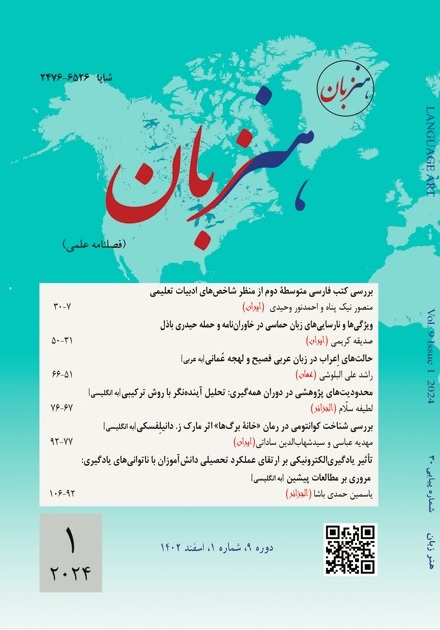محدودیتهای پژوهشی در دوران همهگیری: تحلیل آیندهنگر با روش ترکیبی
DOI::
https://doi.org/10.22046/LA.2024.04کلمات کلیدی:
محدودیتها, انجام پژوهش در دوران همهگیری کووید-۱۹, پیشبینی, دیدگاههای دانشجویانچکیده
مطالعه حاضر به بررسی رویکردهای پژوهشی اتخاذشده توسط دانشجویان کارشناسی ارشد در انجام پروژههای پایانی در دوره پایانی همهگیری میپردازد. این پژوهش با بهکارگیری یک روش ترکیبی، مسیر پژوهش و همچنین نتایج را پیشبینی و تحلیل میکند. یافتهها حاکی از آن است که تجمیعی از عوامل منجر به بروز سطح متوسطی از کیفیت در پژوهشها شده است. این عوامل عمدتاً به این شرح هستند: اول، فقدان همراهی و پشتیبانی مستمر نظارتی از سوی اساتید راهنما. دوم، مسائل سلامت روان که تأثیرات منفی آشکاری داشتند. سوم، فضای نامساعد در دستیابی به جامعه آماری مورد نظر و تبادل نظر با همتایان. چهارم، رویآوردن به سوءرفتارهای علمی. همچنین، احساس نارضایتی در میان مشارکتکنندگان بهطور محسوسی غالب بود و این باور وجود داشت که آنان در شرایط عادی میتوانستند عملکرد بهتری داشته باشند.
مراجع
Bonell, C., Michie, S., Reicher, S., West, R., Bear, L., Yardley, L., Curtis, V., Rubin, G. J., & Amlôt, R. (2020). Harnessing behavioural science in public health campaigns to maintain ‘social distancing’ in response to the COVID-19 pandemic: key principles. Journal of Epidemiology and Community Health. https://doi.org/10.1136/jech-2020-214290
Denzin, N. K., & Lincoln, Y. S. (Eds.). (2018). The SAGE handbook of qualitative research (5th ed.). Sage Publications.
Dodds, S., & Hess, A. C. (2021). Adapting research methodology during COVID-19: Lessons for transformative service research. Journal of Service Management, 32(2), 203–217. https://doi.org/10.1108/JOSM-05-2020-0153
Dwyer, S. C., & Buckle, J. L. (2009). The space between: On being an insider-outsider in qualitative research. International Journal of Qualitative Methods, 8(1), 54–63. https://doi.org/10.1177/160940690900800105
Fraser, B. J., & Fisher, D. L. (1982). Predicting student outcomes from their perceptions of classroom psychosocial environment. American Educational Research Journal, 19(4), 498–518. https://doi.org/10.3102/00028312019004498
Galea, S., Merchant, R. M., & Lurie, N. (2020). The mental health consequences of COVID-19 and physical distancing: The need for prevention and early intervention. JAMA Internal Medicine, 180(6), 817–818. https://doi.org/10.1001/jamainternmed.2020.1562
Goh, S. C., & Khine, M. S. (Eds.). (2002). Studies in educational learning environments: An international perspective. World Scientific.
Han, K., & O'Brien, K. (2019). Toward an indigenized external supervision approach in China. The Counseling Psychologist, 47(4), 582–611. https://doi.org/10.1177/0011000019883263
Kirsch, L. J. (1996). The management of complex tasks in organizations: Controlling the systems development process. Organization Science, 7(1), 1–21. https://doi.org/10.1287/orsc.7.1.1
Midgley, C., Feldlaufer, H., & Eccles, J. S. (1989). Student/teacher relations and attitudes toward mathematics before and after the transition to junior high school. Child Development, 60(4), 981–992. https://doi.org/10.2307/1131038
Möller, J., Pohlmann, B., Köller, O., & Marsh, H. W. (2009). A meta-analytic path analysis of the internal/external frame of reference model of academic achievement and academic self-concept. Review of Educational Research, 79(3), 1129–1167. https://doi.org/10.3102/0034654309337522
Newman, R. S., & Schwager, M. T. (1993). Student perceptions of the teacher and classmates in relation to reported help seeking in math class. The Elementary School Journal, 94(1), 3–17. https://doi.org/10.1086/461748
Rahmah, S. (2018). Pengawas Sekolah Penentu Kualitas Pendidikan. Jurnal Tarbiyah, 25(2), 257–269. https://doi.org/10.30829/tar.v25i2.377
Richardson, M., Abraham, C., & Bond, R. (2012). Psychological correlates of university students’ academic performance: A systematic review and meta-analysis. Psychological Bulletin, 138(2), 353–387. https://doi.org/10.1037/a0026838
Roorda, D. L., Koomen, H. M. Y., Spilt, J. L., & Oort, F. J. (2011). The influence of affective teacher–student relationships on students’ school engagement and achievement: A meta-analytic approach. Review of Educational Research, 81(4), 493–529. https://doi.org/10.3102/0034654311421793
Sihag, V., & Rijsdijk, S. A. (2019). Organizational controls and performance outcomes: A meta-analytic assessment and extension. Journal of Management Studies, 56(1), 91–133. https://doi.org/10.1111/joms.12393
##submission.downloads##
چاپ شده
ارجاع به مقاله
شماره
نوع مقاله
مجوز
حق نشر 2024 Latifa SELLAM

این پروژه تحت مجوز بین المللی Creative Commons Attribution 4.0 می باشد.
فصلنامه هنر زبان یک مجله دسترسی آزاد است و مقالات پس از پذیرش در دسترس عموم قرار می گیرند و استفاده از آن با ذکر منبع آزاد است
